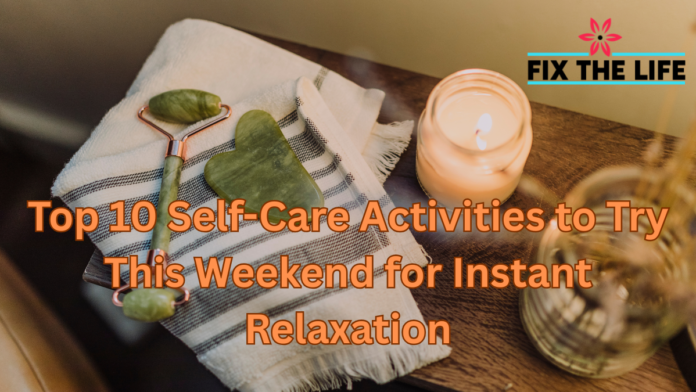The weekend is your time to recharge—but too often, it slips by in a blur of chores, errands, or doom-scrolling. If you’re feeling drained, it’s time to prioritize yourself. These self-care activities aren’t just about luxury—they’re about protecting your mental health and building small habits that leave you calmer, clearer, and more energized.
Whether you’ve got an entire day or just an hour, here are 10 intentional, practical, and soothing relaxation ideas to try this weekend.
Best Self-Care Activities to Try This Weekend
1. Take a Tech-Free Walk in Nature
Unplugging from screens—even for 30 minutes—can reset your brain. Step outside and take a slow walk through a park, trail, or even your neighborhood.
Why it works: Exposure to greenery lowers cortisol levels and helps reduce anxiety. No need for a podcast or playlist—just let your senses tune into your surroundings.
Pro tip: Leave your phone at home or put it on airplane mode to get the full benefit.
2. Treat Yourself to a DIY Spa Session
You don’t need a luxury retreat to feel pampered. Run a warm bath, light a candle, play calming music, and use a face or body mask.
Why it works: Physical relaxation signals to your nervous system that it’s safe to rest. It’s also a great way to reconnect with your body.
Add-ons: Epsom salts for sore muscles, lavender oil for stress relief.
3. Journal Without Pressure
Forget structured prompts or trying to sound poetic. Just write what’s on your mind for 10–15 minutes.
Why it works: Writing helps declutter mental noise, process emotions, and create clarity. It’s especially helpful for quieting overthinking.
Try this: Use the “brain dump” method—dump every thought onto the page without censoring yourself.
4. Cook (or Order) a Nourishing Meal
Nourishment is a form of care. Cook something wholesome that makes you feel good—or treat yourself to a healthy, comforting takeout meal.
Why it works: Eating well supports both your physical energy and your mood. Bonus points if it’s shared with someone you love or eaten slowly with intention.
Simple ideas: Stir-fry with fresh veggies, oatmeal with fruit and nuts, or a warm homemade soup.
5. Practice Gentle Movement
You don’t need an intense workout to feel better. Try slow stretching, yoga, or a casual bike ride.
Why it works: Gentle movement reduces built-up tension and releases endorphins without exhausting your system.
Tip: Look up a 10-minute guided yoga video on YouTube or go freestyle on a yoga mat.
6. Do a Digital Declutter
Take 20 minutes to unfollow toxic accounts, delete old screenshots, or organize your home screen.
Why it works: A cluttered phone or inbox can quietly increase stress. Digital cleanup creates a sense of control and calm.
Bonus: Set app limits for next week to keep your screen time in check.
7. Practice Deep Breathing or Meditation
Just five minutes of intentional breathing can lower anxiety and shift your mindset.
Why it works: Breathwork activates your parasympathetic nervous system, helping the body move out of “fight or flight.”
Simple technique: Inhale for 4, hold for 4, exhale for 6. Repeat 5–10 times.
8. Reconnect with a Friend or Loved One
Text someone you care about and set up a call or coffee date—even a short chat can lift your spirits.
Why it works: Connection is a core human need. Sharing a laugh or checking in with someone can improve mood and reduce loneliness.
Virtual counts too: A 10-minute FaceTime catch-up can be just as fulfilling as meeting in person.
9. Create a No-Pressure Creative Space
Paint, draw, knit, build a puzzle, or color. It’s not about results—it’s about the process.
Why it works: Creative flow helps you slow down and engage your brain in a new, refreshing way.
Best part: You don’t need to be “good” at it to benefit.
10. Take a Guilt-Free Nap
Yes, really. Set aside 20–30 minutes and allow yourself to rest without guilt.
Why it works: Rest is productive. Short naps improve memory, focus, and emotional resilience—especially if your week was demanding.
Key tip: Keep naps under 30 minutes to avoid grogginess.
Final Thoughts
Self-care isn’t a reward—it’s a reset. These self-care activities aren’t about perfection or performance. They’re about listening to your body and mind, and responding with compassion. The more regularly you invest in these practices, the more resilient and grounded you’ll feel—not just this weekend, but every week.
FAQs
Q: How do I make time for self-care on a busy weekend?
A: Start small. Even 10–15 minutes of intentional activity can make a difference. Block time like you would for an appointment.
Q: Are self-care activities the same for everyone?
A: Not at all. Self-care is personal. What relaxes one person may stress another. The key is choosing what works for you.
Q: Can I do multiple self-care activities in one day?
A: Absolutely. Try pairing a physical activity with a mental one—like a walk followed by journaling.
Q: Is watching Netflix considered self-care?
A: Sometimes. If it genuinely relaxes and nourishes you without leaving you drained, it can be part of your routine. Just be mindful of overuse.
Q: How do I turn these weekend habits into regular ones?
A: Track what makes you feel best, then schedule short versions into your weekly routine. Consistency beats intensity.




